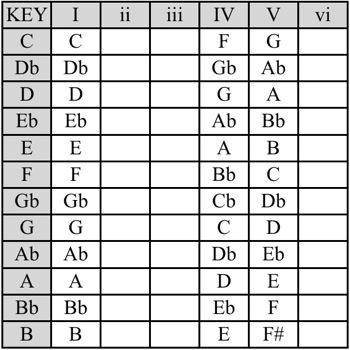Part Two
I, IV, and V Chords, Keys, Chords in D
Concept #4 - Getting Started
For your first exploration into the world of songwriting, it's helpful to establish some "rules." These are not rules in the sense that they cannot be broken; these are suggestions or good ideas. You'll do better if you follow these "rules" most of the time.
Rule Number 1 - Start and end your song with the I chord. This establishes clearly where you are, and helps both you and the listener experience a strong beginning and ending.
Rule Number 2 - I, IV, and V are the three chords you will use most often. Many songs have been written with just these three chords.
Rule Number 3 - Choose a key. We haven't discussed keys yet, so let's address that next. You already know that a major scale can be numbered 1, 2, 3, 4, 5, 6, 7. Each of these numbers represents a note. You can sing the scale or play it on an instrument.
When you sing, you don't always think of the note as having a name, because your voice can sing high and low and everywhere in between. It may not matter to you what note it is as long as it sounds good. But when you play an instrument like the piano, each note has a name and a location on the instrument.
So when you walk up to the piano to play 1, 2, 3, 4, 5, 6, 7, you have to ask a question first. Where is note 1? The answer is you may choose whichever note you like to be note 1. But after you choose note 1, the major scale determines where 2, 3, 4, 5, 6, and 7 are located. You can't just jump around and call them whatever you want. You only get to choose note 1.
Whichever note you choose to be note 1 is the name of the "key." So if you choose a D to be note 1, you will be playing in the key of D. If you choose an A, you will be playing in the key of A.
Choosing note 1, playing the scale, and then finding the chords based on each note in that scale can be a bit of a challenge at first, so let’s simplify things by using the table shown at the right.
Take a look at the table and answer this question. In the key of D, can you name the I, IV, and V chords? It’s easy to find them. The I chord is D, the IV chord is G, and the V chord is A.
So What Does That Mean?
It means you can write a simple song in the key of D if you know how to play just three chords: D, G, and A. You will start the song with a D chord because that's the I chord. You will also end the song with a D chord. Along the way you will use D's, G's, and A's whenever you like.
And what do these chords look like? The diagrams to the right show one way they might be played on a keyboard, and also on a guitar.
Another Intersection
At some point, you will want to learn to play I, IV, and V in other keys, but for now this is enough to illustrate the principle. Our next step is to add in the minor chords: ii, iii, and vi. Just before going in that direction, let’s review what we’ve learned.
Review of Part Two
In Part Two we stated some simple "rules." Start and end your song with the I chord. Along the way use I, IV, and V. Choose a key. If you aren't sure which chords are I, IV, and V, you can look it up in the table.
We learned that a key has the same name as note 1. So if the key is D major, note 1 must be D.
We looked at the chords D, G, and A, both on a keyboard and on a guitar. We recognized the goal of eventually being able to play I, IV, and V in all of the major keys, but rather than taking the time now to explore them, we decided to move on to ii, iii, and vi.
Ready for Part Three?


























